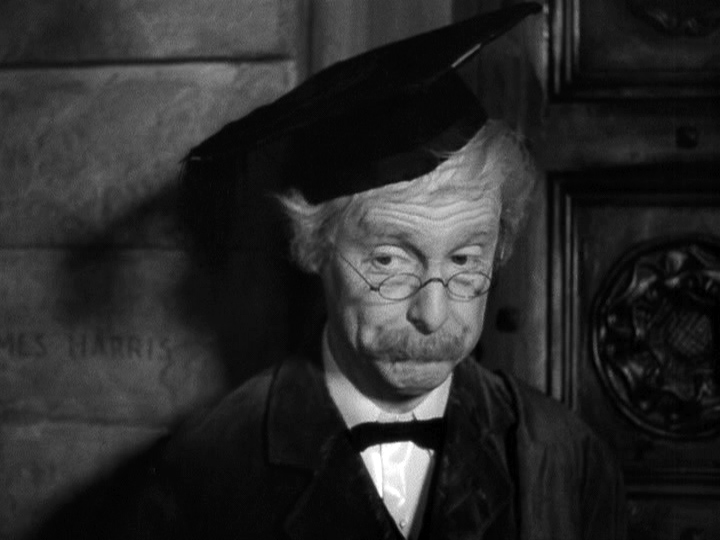NOTE: This was originally published in January 2017.
By Darren Johnson
Campus News
My academic career hasn’t exactly gone the way of Mr. Chips. In case you haven‘t read that book, or seen the movie, he’s the school teacher whose whole adult life was spent teaching generation after generation at a single institution, to the point where he sees the ghosts of those who have passed away in the same classroom seats they used to occupy; he teaches their sons and perhaps even grandsons – I can’t remember the finer points of the plot now – to where he’s on his deathbed at the end, surrounded by his students, they telling him his life had meaning, after all. He became at one with the institution, physically and spiritually, forever …
Must be nice. My academic career has been quite the opposite.
So far, I have taught, at least as an adjunct, though sometimes at a full-time capacity, for two SUNY community colleges, two SUNY four-year universities and two private colleges. Often, my full-time capacity was in administration, and I also taught part-time at the same place. My administrative office would serve as a spot for my students to visit, as if I were a full-time faculty member. I have been unionized and sometimes not, playing for Darth Vader’s team up on the hill (at colleges, the alleged bad guys are always up on a hill). Though often I was unionized in some way, even if it were in some relatively powerless adjunct union. Currently, at 47, I am teaching full-time in a non-tenure track, but am in the full-time union (I think; they’ve never really formally welcomed me or anything – they have been reeling a bit due to various department cuts, and the mass emails I get from them tend to be in panic mode, not exactly warm).
I have been a fly on the wall in all key college areas in this new century, where tenure isn’t what it used to be, and the right-brain part of colleges is atrophying while the left-brain is fed and prospers. There’s the adjunct issue, of course – essentially a B-team of low-paid, benefitless mercenaries – which isn’t fair whatever way it’s looked at. There are fewer students to choose from, so enrollments are down at middle- and lower-tier institutions. At least at those colleges that don’t market well. Online colleges steal some bodies. There’s what’s called administrative bloat – administrations have grown over the decades while the number of full-time faculty has plateaued. Does anyone in administration ever get fired? Or, is it, when an administrator’s skills diminish, they just give him a management title and more help? Assistant directors, coordinators, etc. Thus the bloat. Then there are the faculty members who are full-time, but not on the tenure track. They better have an interesting side gig, or else there will be some Christmases without presents for the kids. These instructors can never get comfortable, have to always keep their skills up to date, as well as their resumes. I know I have yet to cancel my e-subscription to HigherEdJobs.com.
The first college I worked for went broke, in essence, turning me into an untrusting mercenary, infuriated to know that there is no Santa Claus, and that Mr. Chips was just a fantasy. From there, I re-branded myself as a change-agent, and gravitated to colleges that were at various levels of dysfunction and need, sometimes helping right their ships and getting enrollments back up. Now I’m just a mere instructor and can only help students one class at a time. But there was a time when I was doing a lot more for helping colleges with their enrollments. It was a lot of fun, but also a lot of work – and rarely appreciated. So I’ve simplified my life a bit.
At one point, Mr. Chips is challenged by the administration. They say he sucks as a teacher, that he’s boring the students to death, that someone younger could do better. But he survives that challenge, and eventually old becomes new again, and the students learn to appreciate the guy.
But in reality, faculties and administrations are divided everywhere. In these trying times, both sides hate the other. Here’s what needs to change, but probably won’t:
- Both sides have deadwood and need to put it into the wood chipper. “Deadwood” is a term that refers to employees who have lost their zest and usefulness, but hang in there. The administrations need to admit that they have bloat. They have some high-priced members who really aren’t all there any more, and some positions that perhaps were created once-upon-a-time and no longer are trendy or needed. The faculty have to admit that some professors are mailing it in. They got tenure many moons ago and haven’t really been all that active academically since, regurgitating the same lectures decade after decade. For public colleges, are either type of deadwood fair to the taxpayers? The students? Perhaps like an episode of “Survivor,” the faculty and administration could get together and vote an equal number of people off the island? And replace them with some with eager new grads? Which brings us to the next issue …
- There are too many grad schools, which mostly are a money-grab for four-year colleges, producing more people with doctorates than society really needs. Which leads them to become …
- This situation can’t go on much longer. They get academic graduate degrees but can’t get real academic jobs, so they have to settle for teaching gigs that pay a tiny fraction of what everyone else is earning. They often have equal education compared to the full-timers, but have very unequal pay. Which makes me wonder …
- Is hiring full-timers a popularity contest? Are people hired who “fit in?” Or are they truly the best and brightest and hardest working? And this makes me question all of academic culture, including asking …
- Why are people trained in analytics and the scientific method so reliant on rumor and gossip to make decisions? I’ve seen so many academic people suffer through whisper campaigns and even false accusations, sometimes losing their positions, because of the vitriol people pass in secret in the corridors. Maybe academia could learn from their law schools: Innocent until proven guilty, hearsay is not admissible, etc., etc. Which makes me conclude that …
- The people who last the longest at any one college – the Mr. Chips – are usually the spreaders of the worst information, the most bitter and unhappy, the most likely to resist change. Or, they fly under the radar and become deadwood, counting the days to retirement. Either way, it’s not productive. Perhaps they have gotten to a pay grade where they can’t in good conscience leave, and it’s not like other colleges want to hire someone disgruntled, who hasn’t published much in decades. They are stuck, and unhappy, and they make us all suffer for it.
Except for Mr. Chips, life is short. We need to start acting better. Colleges surely are going through a revolutionary transition. Some will go broke, if they drag their feet and don’t adapt. If costs are too high and morale too low. Every middle- and lower-tier college employee – in administration and faculty – has to decide, How am I going to help the students? Help my colleagues? Save this place?
Maybe Mr. Chips needs to go into the wood chipper…







Facebook Comments